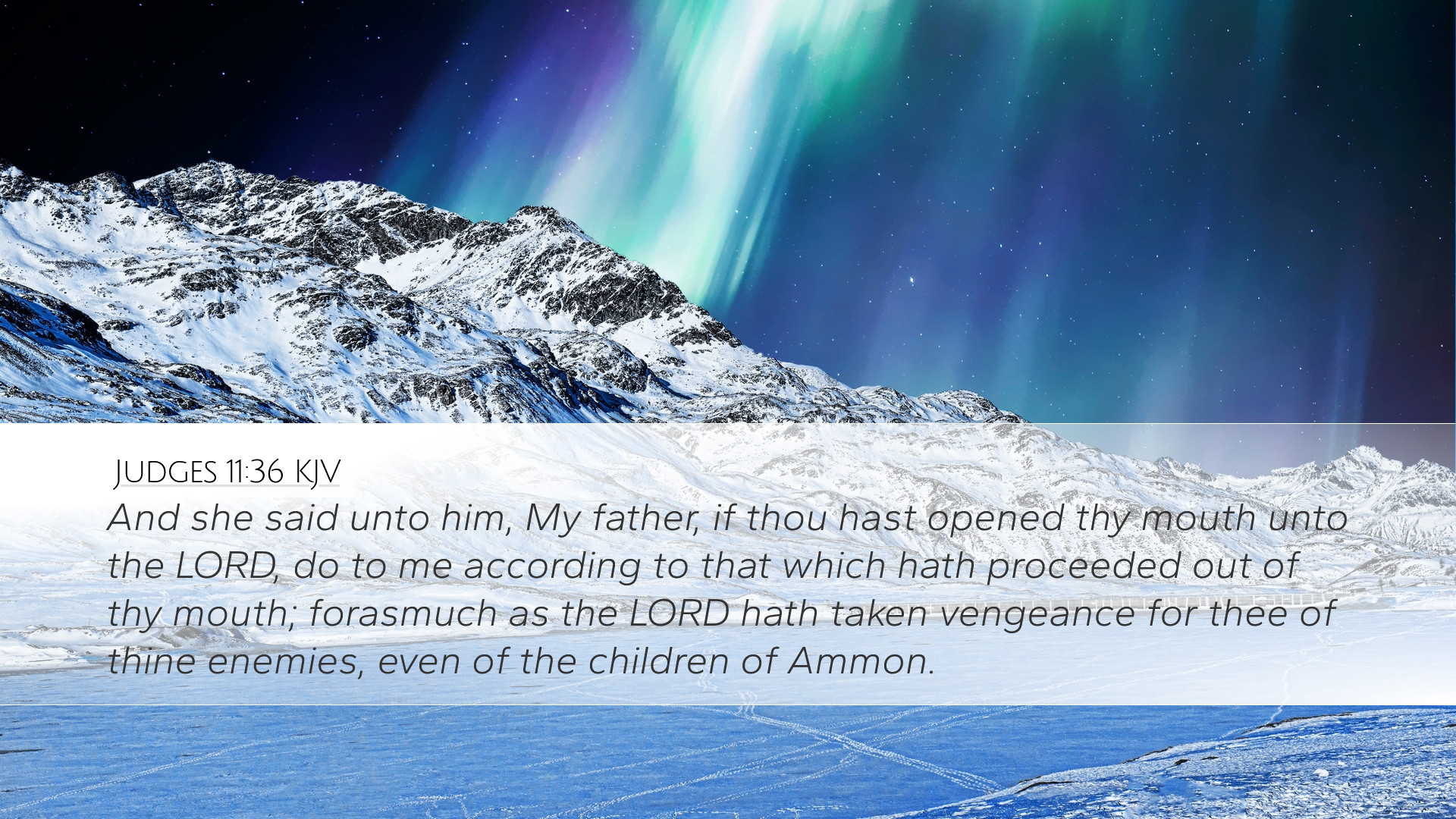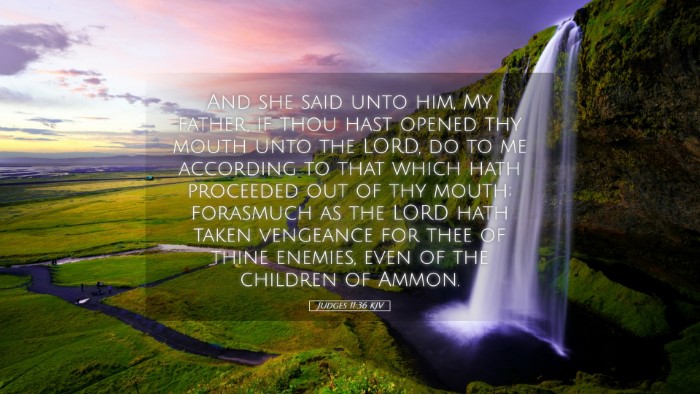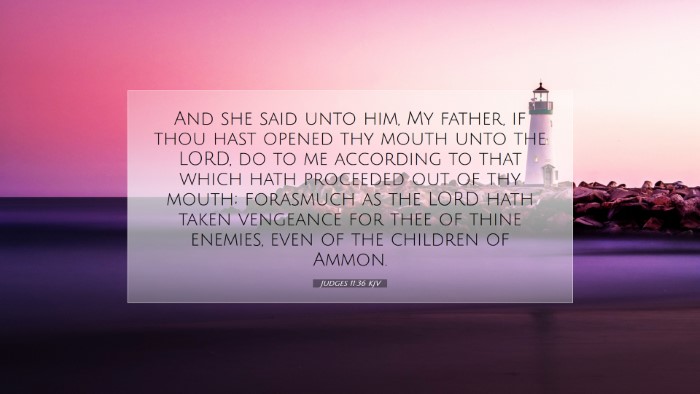Commentary on Judges 11:36
Introduction
Judges 11:36 presents a profound moment in the narrative of Jephthah, who makes a tragic vow that shapes the course of his life and the lives of those around him. This commentary seeks to explore the intricacies of this verse by drawing insights from esteemed public domain commentaries, providing a robust analysis for pastors, students, theologians, and Bible scholars.
Contextual Overview
Jephthah, a judge of Israel, emerges from a background marked by rejection and conflict. His vow to sacrifice whatever comes out of his house to meet him upon returning from battle indicates a deep commitment to God but also reflects a moment of desperation and rashness. Understanding the cultural and historical context surrounding this narrative is crucial.
Verse Analysis
Judges 11:36 states:
"And she said unto him, My father, if thou hast opened thy mouth unto the Lord, do to me according to that which hath proceeded out of thy mouth; forasmuch as the Lord hath taken vengeance for thee of thine enemies, even of the children of Ammon."
1. The Nature of Vows
Albert Barnes emphasizes the seriousness of vows made before God. In the Hebrew culture, a vow was not taken lightly; it compellingly bound the vower to its fulfillment. Jephthah's vow exemplifies a commitment that bordered on imprudence, raising questions about the nature of his faith and understanding of God's will.
Matthew Henry notes that Jephthah's desperation led to this rash commitment. Instead of consulting the Lord for direction, he acted impulsively, illustrating a perennial human struggle: the tension between faith and impulsiveness.
2. The Response of Jephthah’s Daughter
The response of Jephthah’s daughter is pivotal in this narrative. She approaches her father with grace and understanding, indicative of a deeper spiritual maturity. Adam Clarke highlights that her acceptance of her father’s vow reflects a strong faith. She understands the seriousness of the vow and the divine implications of its fulfillment.
Her request for a period of mourning reveals her wisdom and the weight of the impending sacrifice, encapsulating the emotional toll of Jephthah's vow. Matthew Henry further points out that her request demonstrates strength of character, as she seeks to honor both her father and God, indicating her own faith and maturity.
3. A Reflection of Israel's Spiritual State
This narrative also reflects the larger spiritual state of Israel at the time. The cycle of sin, punishment, repentance, and deliverance is evident throughout the book of Judges. Albert Barnes asserts that the plight of Jephthah and his daughter serves as a microcosm of Israel's division and social disarray. The lack of spiritual leadership led to desperate decisions, echoing the societal chaos prevalent during this era.
Theological Implications
1. The Dangers of Rash Vows
From the text, it is imperative to understand the theological implications of making vows. Matthew Henry warns against the impulsivity that can lead to dire consequences. This narrative serves as a cautionary tale about seeking guidance from God before making life-altering commitments.
2. God's Sovereignty and Human Decisions
Despite the tragic outcome, Judges 11:36 also speaks to the sovereignty of God in human affairs. Adam Clarke reminds readers that God’s purposes can be fulfilled even in the midst of human fallibility. Jephthah’s victory was tied to divine assistance, yet his vow resulted in profound personal tragedy.
3. The Role of Women in the Biblical Narrative
The character of Jephthah’s daughter invites discussions about the role of women in biblical narratives. Matthew Henry posits that her response highlights her as a beacon of faith and virtue, challenging contemporary perceptions of female roles in ancient texts. Her willingness to accept her fate reflects profound theological insight and moral strength.
Exegesis and Application
The exegesis of Judges 11:36 should encourage believers to reflect on their own commitments and the weight of their words. The contemporary application of this verse could guide spiritual leaders and congregants in understanding the importance of thoughtful discernment in their vows and commitments before God.
Albert Barnes emphasizes the need for spiritual leaders to guide their communities in making wise decisions, encouraging a prayerful approach to vows. This aligns with the broader narrative of unity and seeking God’s will in all aspects of life.
Conclusion
The story encapsulated in Judges 11:36 provides rich theological insights and practical applications. By examining the complexities of Jephthah's vow, the responses of his daughter, and the implications for Israelite society, we are reminded of the weight of our commitments to God. This commentary draws from the depth and wisdom of historical biblical scholars, providing meaningful reflections for modern readers, students, and pastors alike.
As the church continues to grapple with issues of faith and commitment, the reflections from this verse in Judges can serve as a guiding light in navigating the difficult terrains of faithfulness in a fallen world.


